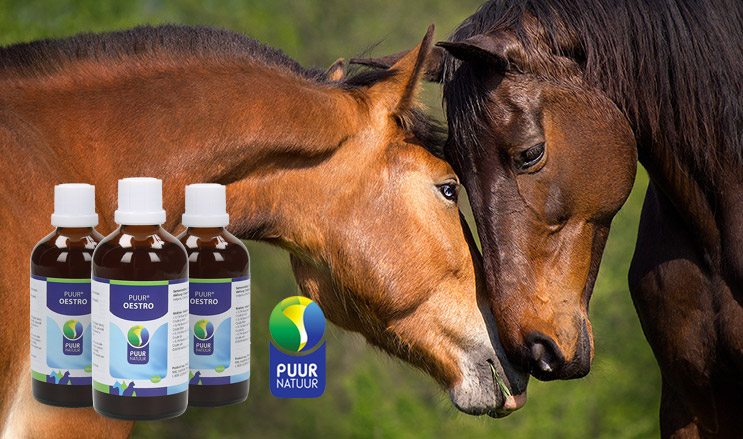Many horse owners complain about cranky mares, during heat cycles. One mare may hardly change when she comes into heat, another one becomes unpredictable, hard to handle or unfocused. A common complaint is that pain signals are also noticeable when touching or brushing / touching the belly. I always listened patiently, but because I only had geldings, I didn't know what people were talking about. Until I got my current horse, a mare. Like a true Cruella she chased our little spotted Appaloosa, as if it was a Dalmatian pup, wanting to make a fur coat out of him. Luckily he is much younger and faster, and now he seems to know better how to deal with her "moods". But there is actually more that can be done to help your horse and make it less moody during this season cycles.
Mares ''In season''
With most mares the heat cycles starts at the end of the winter or the beginning of spring. Each estrous cycle, lasts an average of 21 days; though in the height of summer the cycle can shorten to 18 days. During each oestrus cycle, the mare will be unreceptive for 16 days (known as dioestrus), and then accept the stallion for the last 5-7 days. This is when she is “on heat” or “in season”. Her ovaries become active, meaning they develop 1 or 2 follicles and she begins ovulating.
After 7 to 12 days after giving birth, the mare's foal heat cycle begins again. Many foals get diarrhea during their mothers' foal heat period, so be aware of this!
Some mares will show no signs of estrous. For example, horses with PPID (Pituitary Pars Intermedia Dysfunction or Equine Cushings Disease) and older mares. In these cases cysts can develop on the ovaries or inflammations and infections can cause extremely discomfort and pain. Does your mare still remains sensitive when tighten the girth or touching her, it's recommended to have her checked by a veterinarian, with or without a scan, to check if there are no serious problems.
Geldings
Even geldings can cause problems by reacting extremely violently to mares, especially when they are in heat. They can fully behave as a "stallion" and even want to breed mares. This seems harmless, but is certainly not without risk.
Gestation
The gestation period in mares is about 11 months. The advice is to have an ultrasound made 14 to 18 days after the mating or insemination. This scan is crucial to detect if your mare has conceived twins, as twins can be impossible to detect or resolve later in the pregnancy. A second scan is ideal at 35 days, as many early pregnancies are lost around this time.
At last, about the birth itself: a number of horse owners choose to have their mare to deliver the foal in a different place than their home. It is good to realise that there are different viruses and bacteria present in every place, which an animal naturally defends itself against. It is not recommendable for the immune system of the horse to suddenly move the horse to a totally different environment just before the birth. Moreover, the transportation can always cause stress, which will weaken the immune system. The same applies to too large groups of curious visitors, if the mare is not used to this. Providing rest for both mother and foal is the most important thing!
Does your mare suffer from moodiness? Does your gelding think he is a stallion? Try a supplement with the following ingredients: Agnus Castus, Cimicifuga Racemosa, Alchemilla Vulgaris such as
PUUR Oestro.
